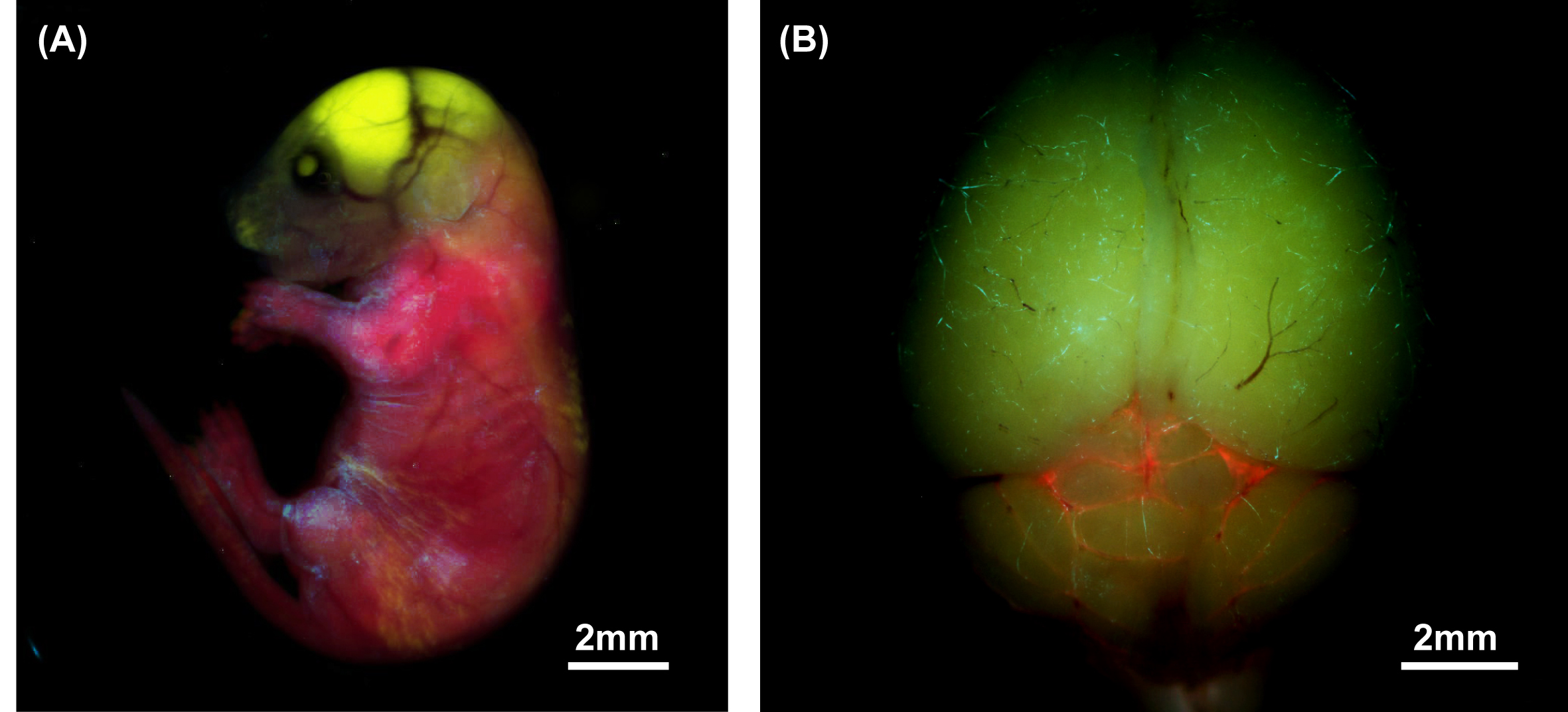 |
April 2022 Mouse of the Month |
TRiCK (TRiple Coloured germ layer Knock-in) mouse
B6(Cg)-Gt(ROSA)26Sor<em1(CAG-venus,-mCherry,-mCerulean)Okn>/26 (RBRC10966)
|
| TRiCK (TRiple Coloured germ layer Knock-in) mouse is a strain that can label all three germ layers that make up the early embryo. This both independent and simultaneous labeling system is achieved by combination with self-cleaving 2A peptides, site-specific recombinases and fluorescent proteins. In brief, TRiCK mouse can be produced by crossing two strains. One is a reporter strain that emits a fluorescent signal (Venus/mCherry/mCerulean) upon induction of expression of site-specific recombinase (Cre/Dre/phiC31o), under the control of both endogenous ROSA26 promoter and exogenous CAG promoter (RBRC10966). The other is a labeling strain that expresses Cre under the control of neuroectodermal marker Sox1, Dre under the control of mesodermal marker T (Brachyury), and pChiC31o under the control of endodermal marker Sox17 (RBRC10967). The TRiCK system has been shown to function not only during early embryonic development but also in adult tissues. In addition, tissue fixation and tissue clearing methods optimized for the analysis of TRiCK mice have been reported. Therefore, the TRiCK mouse is a useful strain for elucidating developmental and regenerative phenomena and pathogenesis. |
| Depositors | : | Hideyuki Okano, M.D., Ph.D. & Takashi Serizawa, Ph.D. Keio University |
|
| Strain name | : | B6(Cg)-Gt(ROSA)26Sor<em1(CAG-venus,-mCherry,-mCerulean)Okn>/26 | |
| RBRC No. | : | RBRC10966 | |
| Strain name | : | B6(Cg)-Sox1<em1(cre)Okn> T<em1(dre)Okn> Sox17<em1(phiC31<*>)Okn>/2-3 | |
| RBRC No. | : | RBRC10967 | |
| Reference | : | Serizawa T, Isotani A, Matsumura T, Nakanishi K, Nonaka S, Shibata S, Ikawa M, Okano H. Developmental analyses of mouse embryos and adults using a non-overlapping tracing system for all three germ layers. Development. 2019 Nov 4;146(21):dev174938. |
Related mouse strains in RIKEN BRC | : | B6(Cg)-Sox1<em1(cre)Okn> (RBRC10968) B6(Cg)-T<em1(dre)Okn> (RBRC10969) B6(Cg)-Sox17<em1(phiC31 <*>)Okn> (RBRC10970) |
Utilized cell resource from RIKEN BRC | : | Mouse embryonic stem cell line B6NJ-22^(UTR) (AES0141) |
| Utilized DNA resources from RIKEN BRC | : | pCAGGS-Cre (RDB08998) | |
| B6N Mouse BAC clone (RDB07573) / B6Ng01-316F09, B6Ng01-307M06, B6Ng01-307A03, and B6Ng01-211A18) | |||
| April 2022 Saori Mizuno, Ph.D. Contact: Experimental Animal Division, RIKEN BioResource Research Center (animal.brc@riken.jp) All materials contained on this site may not be reproduced, distributed, displayed, published or broadcast without the prior permission of the owner of that content. |





